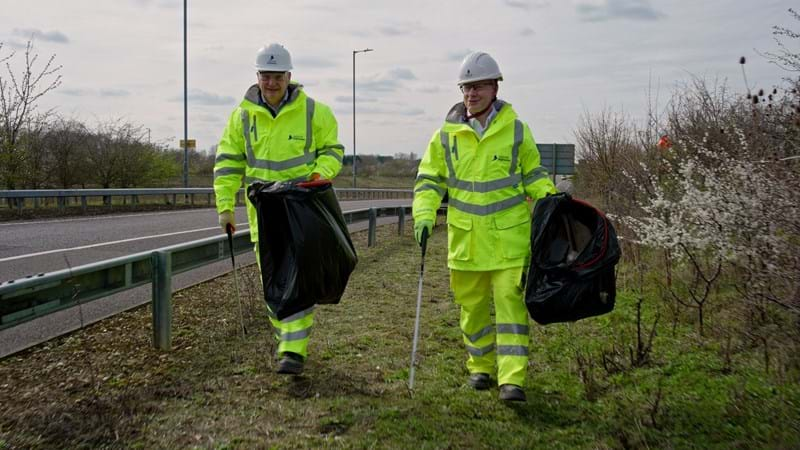Supporting the Great British Spring Clean
Published
28 Mar 2024
Our Chief Executive, Nick Harris, joined local volunteers this week collecting litter on the A428 Hardwick Interchange in support of the Great British Spring Clean.

Share this article
Nick helped volunteers from our staff and supply chain to collect 32 bags of rubbish and remove over 12,000 tree guards.
Volunteers also recycled tree guards to build three large hibernaculums – underground chambers where amphibians and reptiles protect themselves from the winter cold.
Over the past two weeks, our targeted effort in support of the Great British Spring Clean has included litter picks
- on the M3 J19, M25 J28 and M25 J10
- across the South East and East region of our network.
This is in addition to the regular litter picks taking place across our network every day.
Speaking about the issue of litter, Nick Harris, Chief Executive of National Highways, said:
"We take our duties under the Environmental Protection Act (1990) extremely seriously: every day our teams are collecting litter from the road network.
“I have seen at first hand that litter ranges from sweet wrappers to plastic bottles, fast food containers to drinks cans, cigarette butts to, unbelievably, human waste (disposing of this involves specialist teams and, inevitably, more taxpayers’ money). Many of the 1.3 million vapes discarded in the UK each week end up on our roadsides too.
“Once we’ve picked litter, it returns quickly, particularly around motorway service area slip roads and at junctions. Undeterred, we’re working with partner organisations to target behaviour change initiatives, ramp up enforcement activities, increase litter picking and improve litter disposal options."
Lend a paw - bin your litter
Discarded food, fruit cores and peels are also litter. In a survey we ran, almost a third of respondents thought that throwing an apple core or leftover food onto the road benefitted wildlife. The reality is that it can cause immense harm.
Recent figures from the RSPCA revealed that it had received over 10,000 reports of animals found injured, trapped or dead from discarded litter in the last three years – nearly 10 per day.
Most people would be shocked if they knew the impact of litter on wildlife – possibly shocked enough to change their behaviour.
That’s why it’s the subject of our new anti-littering campaign Lend a Paw – bin your litter.
Innovating to tackle litter
Coinciding with this year’s Great British Spring Clean, we've announced two new innovative trials to reduce littering on our network:
Geofencing laybys
Geofencing is way to send messages to drivers entering laybys where littering is a problem, urging them to use bins or take their litter home.
It uses GPS (Global Positioning System) technology to trigger a response when a mobile device enters or leaves a particular area.
We geofenced around 100 laybys on the A50 in Derby and the A180 to Immingham Port for the trial.
Drivers who stopped in these laybys received messages to bin or take home their litter. As of 31 January 2024, a total of 245,021 messages were viewed
The trial helped identify the two most heavily used laybys - those which attracted the most read messages. This will help us develop better strategies to tackle litter at those locations.
Solar-powered compactor bins
We've been trialling solar-powered compactor bins since October 2023 in an A180 layby.
Due to the volume of litter being placed into the bins, the bins were regularly overflowing.
Compactor bins crush litter, solving the overflow problem.
As a result, local authority can reduce it's emptying regime from six days a week to two, saving time and money as well as improving road worker safety.
At National Highways, we comply with our duties under the Environmental Protection Act and are responsible for collecting litter from England’s motorways and a small number of A-roads.
We work closely with partners, including local authorities, who collect litter on most of the country’s A-roads.
Get more information on the Great British Spring Clean.
